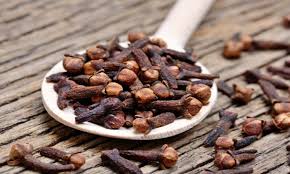Herbs and Spices - Clove

Clove
Cloves are native to the Moluccas, formerly known as the Spice Islands of Indonesia. They have been consumed in Asia for more than 2,000 years. Owing to their sweet and fragrant taste, Chinese courtiers dating back to 200 BC would keep them in their mouths in order to freshen their breath when addressing the emperor so as to not offend him. Arab traders brought cloves to Europe around the 4th century, although they did not come into widespread use until the Middle Ages when they became prized for their pungent flavor that served to mask the taste of poorly preserved foods.
While for a long time, they were cultivated almost exclusively in Indonesia, today the leading clove-producing region is Zanzibar in Eastern Africa. In addition to these two regions, cloves are also grown commercially in the West Indies, Sri Lanka, Madagascar, India, Pemba and Brazil. Like other spices, cloves are available throughout the year. They are renowned for providing their uniquely warm, sweet and aromatic taste to ginger bread and pumpkin pie, but they can also make a wonderful addition to split pea and bean soups, baked beans and chili..
Cloves are the unopened pink flower buds of the evergreen clove tree. The buds are picked by hand when they are pink and dried until they turn brown in color. Cloves are about 1/2-inch long and 1/4-inch in diameter and with their tapered stem, they resemble tiny nails. In fact, their English name is actually derived from the Latin word clavus, which means nail. Although cloves have a very hard exterior, their flesh features an oily compound that is essential to their nutritional and flavor profile.
People use the oils, dried flower buds, leaves, and stems to make medicine. Clove is most commonly applied directly to the gums for toothache, pain control during dental work, and other dental-related issues. In foods and beverages, clove is used as a flavoring. In manufacturing, clove is used in toothpaste, soaps, cosmetics, perfumes, and cigarettes. Clove cigarettes, also called kreteks, generally contain 60% to 80% tobacco and 20% to 40% ground clove.
Benefits:
1.High in antioxidants: Cloves are high in antioxidants, including eugenol, which can help reduce oxidative stress.
2.Can kill bacteria: Studies show that cloves may promote oral health, thanks to their antimicrobial properties, which may help kill harmful bacteria.
3.Improve liver health: Some studies show that cloves and the compounds they contain may help reduce oxidative stress and protect the liver.
4.Clove contains significant amounts of an active component called eugenol, which has made it the subject of numerous health studies, including studies on the prevention of toxicity from environmental pollutants like carbon tetrachloride, digestive tract cancers, and joint inflammation. In the United States, eugenol extracts from clove have often been used in dentistry in conjunction with root canal therapy, temporary fillings, and general gum pain, since eugenol and other components of clove (including beta-caryophyllene) combine to make clove a mild anaesthetic as well as an anti-bacterial agent.
Serving way:
• Pierce an onion with whole cloves and add to soups, broths or poaching liquids.
• Adding ground cloves and curry powder to healthy sautéed onions, garlic and tofu will give this dish an Indian-inspired zest.
• Impart a warming note to apple cider by adding ground cloves and cinnamon.
• Spice up fruit compote by adding ground cloves.
• Add clove powder, walnuts and raisins to your favorite Thanksgiving stuffing recipe.